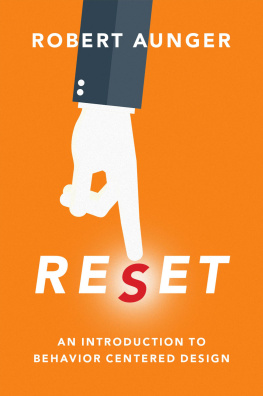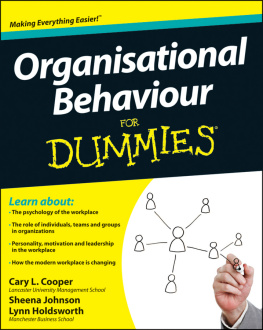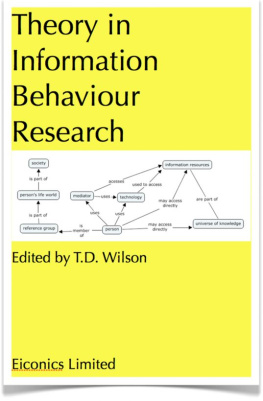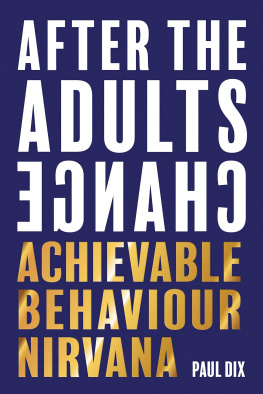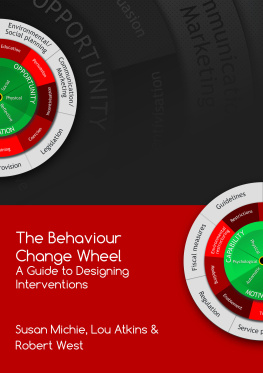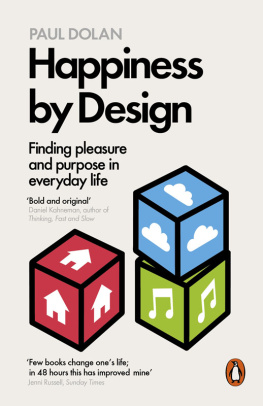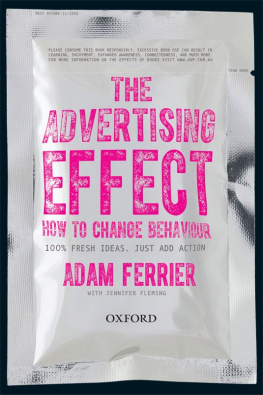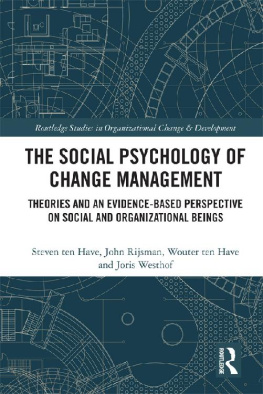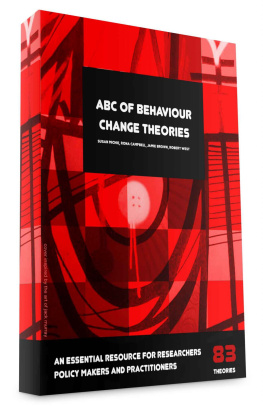Advance Praise for Reset: An Introduction to Behavior Centered Design
Behavior Centered Design (BCD) is built on rich theory that most design approaches lack and practical global experience few practitioners have. The result is a flexible approach that can speak to digital or physical product design as well as to communication campaigns. Whether you are a seasoned behavior change expert or a newcomer, you will find refreshing depth in BCD.
Weston Baxter, Professor of Design for Behavior Change, Dyson School of Design, Imperial College
A must read for any businesses seeking to make a positive difference to their consumers and societies in which they operate. It will provide the basis for genuinely integrating behavior change at the core of their business strategies. Full of great practical examples and framework to follow.
Myriam Sidibe, Senior Fellow, Harvard Kennedy School and author of Brands on a Mission: How to Achieve Social Impact and Business Growth through Purpose
A must-read for researchers, professionals, and policy makers! This book is an intellectual achievement and a milestone in the development of behavior change science. Behavior Centered Design stretches the limits of what we know about the mechanisms of behavior change and also provides a comprehensive and systematic theoretical framework to explain behavior change interventions in research, private and public sectors, and across contexts and populations.
Ivo Vlaev, Professor of Behavioral Science, University of Warwick Business School

Oxford University Press is a department of the University of Oxford. It furthers the Universitys objective of excellence in research, scholarship, and education by publishing worldwide. Oxford is a registered trade mark of Oxford University Press in the UK and certain other countries.
Published in the United States of America by Oxford University Press
198 Madison Avenue, New York, NY 10016, United States of America.
Oxford University Press 2021
All rights reserved. No part of this publication may be reproduced, stored in a retrieval system, or transmitted, in any form or by any means, without the prior permission in writing of Oxford University Press, or as expressly permitted by law, by license, or under terms agreed with the appropriate reproduction rights organization. Inquiries concerning reproduction outside the scope of the above should be sent to the Rights Department, Oxford University Press, at the address above.
You must not circulate this work in any other form and you must impose this same condition on any acquirer.
Library of Congress Cataloging-in-Publication Data
Names: Aunger, Robert, author.
Title: Reset : an introduction to behavior centered design / Robert Aunger.
Description: New York, NY : Oxford University Press, [2021] |
Includes bibliographical references and index.
Identifiers: LCCN 2020009319 (print) | LCCN 2020009320 (ebook) |
ISBN 9780197532638 (paperback) | ISBN 9780197532652 (epub) |
ISBN 9780197532669
Subjects: LCSH: Behavior modification.
Classification: LCC BF637.B4 A88 2021 (print) | LCC BF637.B4 (ebook) |
DDC 153.8/5dc23
LC record available at https://lccn.loc.gov/2020009319
LC ebook record available at https://lccn.loc.gov/2020009320
Contents
Why are professionals from a variety of fields becoming increasingly interested in behavior change? In public health, its because we have failed to solve many of the worlds most pressing health problemsand often not because we dont have solutions, but because they are not used enough. We know that stopping smoking, getting vaccinated, appropriate eating, safe sex, and exercise could solve the majority of the worlds health problems, but they are simply not taken up sufficiently []. Similarly, marketers seek to make products more appealing to consumers but often dont know which insight would be key to changing consumers buying habits. Their frustration is expressed in the famous quote (attributed to Henry Ford, among others): I know half of our marketing efforts work; the problem is I dont know which half. Environmentalists eagerly point out the benefits of recycling and reducing our water use or carbon footprint, but we still fail to do these things. People also form intentions to change their own behavior (e.g., New Years resolutions and dieting plans) but often fail to follow through. All of these situations require a better understanding of how to change human behavior.
Until recently, most approaches to behavior change have been based in trying to change individual cognition in one way or another, either by changing the way people consciously appraise their experiences [], it is time to update our approach to behavior change.
]. The approach has been employed successfully on a range of public health behaviors as well as in commercial product design and marketing.
This book is designed to encourage behavior change practitioners to think differently about behaviorboth in understanding how and why it is produced and in how to design programs to change it. It is broken into two parts, concerned with theory and practice, respectively. Reset begins in ).
Whether you take just some elements from BCD or use it throughout to design a program, it should help you to find creative ways of changing behavior that are surprising, that add value, and that improve the performance of the people in your program. In this way, I hope it can help to make the world a place where more people can flourish.
Reset
therefore presents an introduction to the theoretical resources that inform Behavior Centered Design (BCD), the approach that forms the focus of this book. Theory from evolutionary biology and psychology will be covered and then organized around the problem of behavior change.
Behavior change has recently come to be recognized as an important objective in many fields:
Public policy (to increase compliance with governmental initiatives)
Marketing (to achieve brand switching or brand loyalty)
Education (to improve student outcomes)
Business management (to increase profits)
Health promotion (to achieve public health improvements)
City planning (to advance the design of buildings and public spaces)
Sport psychology (to improve performance)
Website design (to improve the user experience)
Self-help efforts (e.g., financial goal achievement).
It is being heralded as a policy cure-all in the halls of government, as the latest fad to improve learning in schools or to make marketing more scientific, and as a necessary lynchpin of successful programs in public health. Behavior change is thus a hot topic in many fields.
The concept of behavior change implies that preferred courses of action are perceived as possible but tend not to occur. It is often seen as being hard to achieve. Failed New Years resolutions, neglected dieting regimes, and unused gym subscriptions are given as examples. However, changes in behavior are happening everywhere, all the time. Social life has changed considerably: we now live in megalopolises and fly from continent to continent. Some people now cope with multiple switches in their jobs over their career (whereas people used to be born and die in the same profession, and previous to that, everyone had the same profession: farmer!). We participate in numerous social networks (e.g., church members, bridge club, work groups, sports teams, hobby clubs) rather than just being kin or neighbors. People have learned to deal with novel institutions: children spend half their daily lives in school; many people now keep some of their money in a bank and use virtual money in the form of credit cards or bitcoin. People take regular baths, give birth in hospitals, drive cars, wear glasses or hearing aids, take a pill to prevent conceptions, and fling dirty dishes into a dishwasher. In 1985, no one could telephone others while they were on the run; 30 years later, many people in the poorest villages in the developing world are using mobile phones. The Internet has disrupted many old behaviors since its introduction around 1995: interpersonal communication (letter-writing to email to Twitter), consumption patterns (physical to online shopping), and even reading books (now done on screens rather than in printed form). In fact, for this increasingly important kind of behavior changelearning to live with new technologiesthe rate of adoption is becoming

